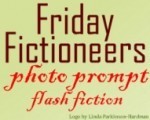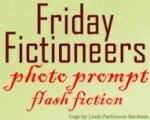Phyllis Anne Duncan (P. A. Duncan)'s Blog, page 50
June 7, 2013
June Friday Fictioneers is Busting Out All Over!
 This week’s photo was quite the poser. I looked, walked away from the computer, then looked again. Yep, it was the same both times. It spawned the whine, “How will I ever come up with something for this?”
This week’s photo was quite the poser. I looked, walked away from the computer, then looked again. Yep, it was the same both times. It spawned the whine, “How will I ever come up with something for this?”
Then for some reason I thought about a time in my life when my parents were separated and my time with my father, who was in the Army, became less and less. Whenever I did see him, it was as if he tried to outdo the previous present he brought me. All I wanted was the time with him, but how does a five year old communicate that?
So, today’s photo made me think about what part-time dads would do to keep their daughters their little girls, and “Young at Heart” came to me. I seem to be on a sentimental kick lately, but I’m certain the dark will return. It better.
As usual, if you can’t see the link on the story title, scroll to the top of the page, click on the Friday Fictioneers tab, then select the story from the drop-down list.


June 3, 2013
Gearing Up for Tinker Mountain Redux
By this time next week, I’ll be at my first craft lecture at the Tinker Mountain Writers Workshop. Last year’s experience was the highlight of my fledgling fiction-writing career–twenty pages of a WIP thrown out to eight strangers and an author whose work I admired and which received very positive feedback. But, before that happened, I shook in my Tevas, I was ready to go home the first night, and I had convinced myself I’d made a bad decision. Then, it all turned out completely differently and gave me a confidence boost I’m still surfing.
Of course, being the nervous Nellie I am, I’m already tying my stomach in knots over attending Fred Leebron’s Advanced Novel workshop. I had put in for Beginning Novel, which seemed logical. I have all these unpublished novels in various stages of completion–unpublished being the operative word. Not enough people signed up for Beginning Novel, so I was faced with the choice of re-taking the same workshop from last year (which would be good but there’s nothing like fresh eyes on your work) or not attending Tinker Mountain at all.
After I lamented this on Facebook, a writer friend suggested Leebron’s workshop would be the best option. One glance at Leebron’s bio at Gettysburg College, where he teaches writing, is intimidating, and he’s also a founder and director of TMWW. That’s like taking a constitutional law class from the President, but every writer friend I know who has had Leebron for a workshop has praised him for providing just the right critique.
Okay, gulp. Twenty pages of a different WIP polished and sent off to more strangers and an author whose work I’m not as familiar with–though that will change.
Really, I’m ready to go right now. My head is in the right space for it, and I know in the next week I’ll start that hideous second-guessing I always do and work myself into a tizzy of self-doubt.
I’m a writer; it’s my job to doubt myself.


May 31, 2013
The Last Friday Fictioneers of May
Okay, it’s the end of May. How could we be five months into 2013? Wasn’t it just New Years last week? Time flies when you’re writing.
I’ve had some good carry-over from last week’s retreat–Monday’s post on the retreat itself, a pretty killer political blog post on Wednesday (Click here if you’re interested; if you’re not politically to the left of Stalin, you won’t enjoy it, so you might want to skip it unless you are.), a draft of a new Spy Flash story, today’s Friday Fictioneers (of course), and several more scenes for a novel draft, which had a lot of plot holes. Plus some great writer talk with a writer friend. I love it when the giddiness carries on.
But…a week from Sunday it’s Tinker Mountain Writer’s Workshop, and I’m already doubting the twenty-pages I sent in for the Advanced Novel workshop. Is it advanced enough? Am I advanced enough? Will everybody else hate it? You know, the exact same feelings I had last year about this time.
 Week after week, Rochelle Wisoff-Field manages to find a truly inspiring photo, and today’s is perhaps one of the most intriguing. Yeah, I say that about each of them, but this one is so interesting, I’m sure the collection of stories will be eclectic and amazing.
Week after week, Rochelle Wisoff-Field manages to find a truly inspiring photo, and today’s is perhaps one of the most intriguing. Yeah, I say that about each of them, but this one is so interesting, I’m sure the collection of stories will be eclectic and amazing.
Today’s story, “Put on Your Red Dress,” features my two characters from the Spy Flash short story collection, Alexei and Mai, on a little adventure to find… Well, you’ll have to read it to find out. If you don’t see the link on the title above, scroll to the top of this page, click on the Friday Fictioneers tab, then select the story from the drop-down list.


May 27, 2013
The Porches
I’ve never been on a writing retreat. I mean, when I retired three and a half years ago, I figured the rest of my life would be one, long writing retreat, but life intervenes. Yes, I’ve been extremely productive in that time, but one thing or another threw up speed bumps along my writing journey.
So, I watched vicariously on Facebook as author friend after author friend went to writing or artist retreats. I studied the possibilities in Poets&Writers Magazine, but I still wondered if that was for me. I need contact with human beings. Shut me up in a writer’s garret somewhere and leave me to my own devices, and I’ll give stir crazy a bad name.
Still, on this journey to publication, I want to give everything writerly a try, so I signed up to go to a week-long retreat at a place recommended by Mel Walsh Jones–The Porches.  The Porches is the kind of house I grew up in–antebellum, quirky, and with character. I loved it the minute I saw it–minus the shrieking cicadas and the ubiquitous stink bugs. The whole house and the writers rooms are charmingly eclectic with wonderful artwork, intriguing knickknacks, and an amazing collection of books. It is, literally, in the middle of nowhere in Nelson County, Virginia, surrounded by hills and trees. The web page says “on the James River,” but “near” it might be more accurate. However, the foliage is thick enough the James could be out the back door but you couldn’t see it. It is incredibly quiet (even the trains seem subdued) and incredibly inspiring.
The Porches is the kind of house I grew up in–antebellum, quirky, and with character. I loved it the minute I saw it–minus the shrieking cicadas and the ubiquitous stink bugs. The whole house and the writers rooms are charmingly eclectic with wonderful artwork, intriguing knickknacks, and an amazing collection of books. It is, literally, in the middle of nowhere in Nelson County, Virginia, surrounded by hills and trees. The web page says “on the James River,” but “near” it might be more accurate. However, the foliage is thick enough the James could be out the back door but you couldn’t see it. It is incredibly quiet (even the trains seem subdued) and incredibly inspiring.
Take a look at the web site (link above), and see how Trudy Hale started this place, and you’ll be tempted. Give in to the temptation because it’s also incredibly affordable. Though you do bring and cook your own food–which I like–the nightly cost is well less than a stay at a decent hotel, and the more writers in the house, the price goes down. And it’s not necessarily for locals. In addition to me and a writer friend from the Richmond area, there was a poet from Iowa and a novelist from Alaska!
“Quiet time” for writing reigns from early morning until about 1730, when writers gather in the kitchen to make dinner or in the parlor to watch DVDs–and to talk writing in both places. Most often after those evening get-togethers, we go back to our rooms and write some more.

The view from the window of my room at The Porches.
And that quiet time goes fast. In five days and four nights here, I did a read-through of a novel rough draft to identify the plot holes. Got that done on the first day. I worked on the draft of a short story for a contest–editing it from 1,600 words down to the required 1,200 words–and submitted it. I drafted three completely new short stories, between 2,000 and 3,500 words each, as well as several new scenes for the novel, not to mention editing the first twenty pages of it so that was in good enough shape to submit to the workshop I’m going to attend at Tinker Mountain.
The down side? Well, as I said, you are in the middle of nowhere–a half hour to the nearest grocery store–and I was concerned about how long it would take an ambulance to get here if needed (not to mention navigating the narrow road and driveway). Yes, when you get to be my age, you focus on such things. By Thursday when someone needed a ride to Charlottesville to catch transportation to DC, I jumped to volunteer for the drive. I needed to be around people. The quiet time rules are pretty inviolate, and I missed being able to go knock on someone’s door just to chat or bounce ideas off. I had also thought we’d do some readings of our work, but that didn’t come together, because, as I said, after dinner we often went back to writing.
Also, though The Porches has Internet, it is satellite Internet with a minutes limit. Twice we exceeded it and lost Internet access just when I wanted to research, say, condoms in World War II. I think that’s something that needs to be addressed to make a stay here close to perfect. Yes, social media can be distracting, but when you write fiction, which draws a great deal from history, as I do, you need Internet access to research. And, yes, I know such things can wait until I’m back home with my high-speed Wi-Fi, but sometimes when you get the need to know something and can’t get to it, that is just as much a distraction.
Would I do it again? Yes, probably in the fall, because the foliage would be incredible and the humidity way less. It was an incredibly productive week for me, and I accomplished much more than I expected. Going to The Porches was an excellent investment in advancing the publishing journey.


May 24, 2013
Friday Fictioneers Retreating
 Since writing is an essential part of a writing retreat, I had no option but to write for Friday Fictioneers–especially with such a nostalgic photo as we got this week. I’ll be blogging next week on the writer’s retreat, so I won’t go into much detail here, except to say–a whole lot of writing is getting done!
Since writing is an essential part of a writing retreat, I had no option but to write for Friday Fictioneers–especially with such a nostalgic photo as we got this week. I’ll be blogging next week on the writer’s retreat, so I won’t go into much detail here, except to say–a whole lot of writing is getting done!
Today’s story is “Priorities,” and if you don’t see the link on the title, scroll to the top of the page, click on the Friday Fictioneers tab, and select it from the drop-down list.
And don’t forget to check out the two book selling/signing events I’ll be doing the next couple of weeks–see details in the top of the righthand column.


May 20, 2013
Off to Retreat!
This week I’ll be at The Porches in rural, central Virginia at a writing retreat put on by one of my writer friends, Mel Walsh Jones. Since it’s my first writing retreat, I’m not sure what to expect, but I’m hoping I get a lot of editing and revising done on the rough draft I completed for last year’s National Novel Writing Month.
Mainly, I’m looking forward to getting away from all the distractions my house and home town can offer and communing with other writers and perhaps a bit with nature. So, a short post today, and I’ll write more about how the retreat went next week, after I return.


May 17, 2013
Time for Friday Fictioneers
So, I opted to enter a story in the New Letters Literary Awards contest after all. “Unconquered” is actually the epilogue of a novel I’ve been working on for some time; however, with a few minor edits, it worked as a stand-alone story. On the same day, I polished a story I’ve submitted a couple of times to other journals (and had rejected) and submitted it to the Blue Ridge Writers Annual Contest. That story is “Meeting the Enemy.” And we’ll see. I just repeat my mantra: “You won’t get published if you don’t submit; rejection is part of the process; acceptance awaits.”
Mantras aside, I’m crossing my fingers, toes, legs for a little luck.
 One of the best things about Friday Fictioneers is seeing how other writers interpret the photo prompt. A single photo can inspire romance, horror, speculative fiction, historical fiction, genre mash-ups, and much more. It just reinforces that as writers our imaginations hold sway over all we do. A fascinating process which we sometimes can’t see in ourselves but can see in other writers. I always think that what I come up with is obvious; yet, when I read other Friday Fictioneer stories I’m amazed at the breadth of the creativity–and sometimes our lunacy.
One of the best things about Friday Fictioneers is seeing how other writers interpret the photo prompt. A single photo can inspire romance, horror, speculative fiction, historical fiction, genre mash-ups, and much more. It just reinforces that as writers our imaginations hold sway over all we do. A fascinating process which we sometimes can’t see in ourselves but can see in other writers. I always think that what I come up with is obvious; yet, when I read other Friday Fictioneer stories I’m amazed at the breadth of the creativity–and sometimes our lunacy.
Perhaps I’ve been too inundated by trailers for the new adaptation of The Great Gadsby in the past week or so. At least it seemed that way when I looked at today’s Friday Fictioneers inspiration photo. The excesses of the Jazz Age were echoed by the “Summer of Love” in 1967, which, being a teenager stuck on a farm, I only participated in vicariously. The parties in the two eras may have involved different stimulants, but the debauchery was just as, well, debauched. That’s what came to my mind, immediately followed by what it might be like for a hard-partier decades later, perhaps someone who didn’t put the party days behind her.
That led to “Sex, Drugs, and Rock and Roll.” As usual, if you don’t see the link on the story title, scroll to the top of the page, click on the Friday Fictioneers tab, then select the story from the drop-down list.


May 13, 2013
Second Thoughts on Entering a Contest
You think I wouldn’t be contest adverse after a successful contest experience this past weekend, but I am wondering if there’s a particular one I’d identified I should just skip. It’s the New Letters Literary Award, with entries due by May 17. Yep, Friday. The kicker is the short story to be entered should not exceed 8,000 words.
New Letters is the literary journal for the University of Missouri-Kansas City, and you get an actual monetary prize for a winning entry, and all entries will be considered for publication in the journal.
I don’t have any 8,000-word stories in the works right now. Everything I have is around 2,000 – 3,000. Yes, it says “not to exceed” 8,000, but I’m wondering if anything at the lower end of that number would even be considered. I did pull a chapter from a work in progress, which would make a decent stand-alone story, and it comes in at right around 3,000 words.
And, yes, I know I could write something original, and that’s usually not a problem for me to sit down and thrown out 5,000 or 6,000 words in a couple days’ time. But with five days left to refine and edit it until it’s presentable? I don’t know.
Over-analyzing much? Probably so, and mostly my fault for not paying attention to the deadline until May actually rolled around. However, you don’t win or get your entry read unless you roll the dice and enter. I’ve given myself until Thursday to decide if the entry I had in mind is in good enough shape to submit.
The next time someone says to me, “Oh, writing. What an easy job,” I’ll restrain myself from exploding. Still, if the process weren’t challenging, if it didn’t make you question yourself and your writing daily, hourly even, it really wouldn’t be worth it.


May 11, 2013
Weekend Updates
I’m walking on air! The short story, “Marakata,” I entered in WriterHouse’s 5th Anniversary Contest (500 words, theme: emerald) won third place. It was a blind judging, where an actor read aloud all the entries. During the break, while the WriterHouse staff counted the votes, I overheard several people talking about it: “Beautiful!” “Read like a parable.” “Very engaging.” “Marakata, I loved that one.” That will boost an author’s ego. Still, there were twelve other really great stories, so when “Marakata” was announced as the third place winner, I was delighted. My prize? A writing craft book entitled Steering the Craft, by none other than one of my all-time favorite sci-fi authors, Ursula K. LeGuin. A win-win.
Through Sunday, and in honor of National Short Story Month, you can purchase for your Kindle all three of my short story collections–Blood Vengeance, Fences and Other Stories, and Spy Flash–for free. You read correctly–free. Just go to my Amazon Author Page, and you’ll find them all there. You know your mother needs some new short story collections for Mother’s Day, right? 


May 10, 2013
Hopeless Friday Fictioneers Romantic
A good writing week. Well, any time I’m writing, it’s good. There’s one exception, though. I wanted to enter a contest whose deadline is May 17. The story can be up to 8,000 words, which, after all my flash fiction writing, seems like an enormous amount. I’m trying to adapt a chapter from one of my novels, but it’s not quite working out; however, I’ll keep at it until the deadline and make a decision then.
Tonight is the fifth anniversary of Charlottesville, VA’s WriterHouse, where you can find a quiet place to write and some excellent writing and publishing workshops. At tonight’s party, there will be a contest: You had to submit a 500-word story based on the theme “emerald.” (Emerald is the fifth anniversary gem stone and Pantone’s color of the year for 2013.) So, I’ll be there tonight for the live judging of my story, one of thirteen. An actor will read each story to the assembled masses, and then we vote. Fingers crossed they’ll like my little fantasy tale, “Marakata.”
 A great photo today by Friday Fictioneer Ted Strutz brought back memories of various pick-up lines tried on me in bars. I remember one alleged Navy pilot who tried the “there-I-was-at-10,000-feet-with-MiGs-on-my-tail” approach, who then slid away after I questioned his aviation knowledge–he didn’t know I was a pilot. It was obvious he wasn’t after just a few sentences. Ah, good times.
A great photo today by Friday Fictioneer Ted Strutz brought back memories of various pick-up lines tried on me in bars. I remember one alleged Navy pilot who tried the “there-I-was-at-10,000-feet-with-MiGs-on-my-tail” approach, who then slid away after I questioned his aviation knowledge–he didn’t know I was a pilot. It was obvious he wasn’t after just a few sentences. Ah, good times.
For some reason Ted’s photo brought out the hopeless romantic in me and resulted in “If at First You Don’t Succeed…” Light and airy and very different from what I usually do, which is dark and dense, so I’ll need to go write some mayhem to restore the balance in the universe.
As usual, if you can’t see the link on the title above, scroll to the top of the page and click on the Friday Fictioneers tab. Then, you can select the story from the drop-down list.





